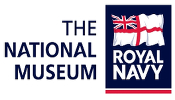INTRODUCTION
By
1914, many factors - industrialisation, nationalism,
military and naval rivalry, colonialism - had combined to
prepare the nations of Europe, and those further afield
for war. The inter-relationships of these factors are
complex and even now somewhat uncertain. What is certain
is that the assassination of an Austrian Archduke by a
Serbian-inspired student in June 1914 led to World War.
And to Britain going to the defence of Belgium, in the
supposed words of the German Chancellor, 'over a scrap of
paper' - in fact the 1839 Treaty of London signed by
Britain, Prussia, France, Austria and Russia guaranteeing
the neutrality of Belgium.
Some
of the more important steps leading to the Great War can
be traced from the Franco-Prussian War of 1870-71 with
Germany's subsequent rise to power and the decline of
France as the number one continental European nation.
Germany then posed a challenge to Britain's overseas
empire and naval supremacy, and France changed from
British enemy to ally.
INTERNATIONAL
EVENTS 1870-1914
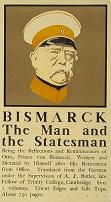 1870-71
-
Franco-Prussian War - In July 1870, France declared
war on Prussia in part over a disagreement about a
Prussian prince accepting the crown of Spain. By September
1870, a French army had been defeated, Emperor Napoleon
III captured at Sedan, France declared a republic, and
Paris under siege. In January 1871, Wilhelm I of Prussia
was crowned Kaiser Wilhelm I of a unified Germany at
Versailles, Paris fell, and France surrendered, losing
Alsace and Lorraine and forced to pay huge reparations.
Otto von Bismarck (left, at the end of his career),
Chancellor of Prussia since 1862, and now Germany,
subsequently sought to keep France isolated to prevent the
recovery of Alsace and Lorraine.
1870-71
-
Franco-Prussian War - In July 1870, France declared
war on Prussia in part over a disagreement about a
Prussian prince accepting the crown of Spain. By September
1870, a French army had been defeated, Emperor Napoleon
III captured at Sedan, France declared a republic, and
Paris under siege. In January 1871, Wilhelm I of Prussia
was crowned Kaiser Wilhelm I of a unified Germany at
Versailles, Paris fell, and France surrendered, losing
Alsace and Lorraine and forced to pay huge reparations.
Otto von Bismarck (left, at the end of his career),
Chancellor of Prussia since 1862, and now Germany,
subsequently sought to keep France isolated to prevent the
recovery of Alsace and Lorraine.
1870
- Rise of Italy - The French garrison of Rome
withdrew during the Franco-Prussian War. The city was
seized by Italian forces and the unification of Italy was
accomplished with Rome as capital.
1878
- Break-up of the Ottoman or Turkish Empire in Europe
- Following the independence of Greece in 1832, the
dissolution of the Ottoman Empire continued after the
1877/78 Russo-Turkish War with the Congress of Berlin.
Montenegro, Serbia (both part of the old southern
Yugoslavia) and Rumania were made independent. A 'small'
Bulgaria also became independent, but the remainder stayed
Turkish. Bosnia-Herzegovina (also part of the old
Yugoslavia) was administered by Austria while remaining in
the Ottoman Empire. Britain gained Cyprus. Russia and
Austria continued their rivalry for power in the Balkans.
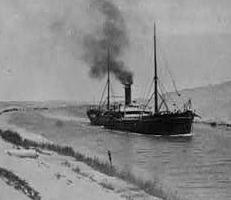
1879
- Dual Alliance of Germany and Austria-Hungary -
Reached between Germany and Austria-Hungary against
possible attack by Russia.
1881/82
- European Occupation of North Africa - 50 years
after annexing Algeria, France declared Tunisia a
protectorate. Then in 1882 Britain occupied Egypt (also
part of the decaying Ottoman Empire) partly to protect the
Suez Canal (right, in 1904). Only Tripoli (or
Libya) still part of the Ottoman Empire and independent
Morocco stayed free of European domination for now.
1882
- Triple Alliance of Germany, Austria-Hungary, and Italy
- Against the threat of French attack, Italy joined the
three year old German-Austrian Alliance to form the Triple
Alliance. Chancellor Bismarck thus continued his policy of
isolating France. Rumania also joined the Alliance.
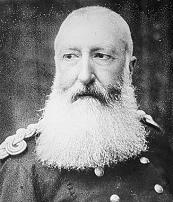
1884
-
European Colonisation of Africa - In 1876 Leopold
II of Belgium (left, in 1903) started exploiting
the Congo and European interest in African colonies grew.
Then at the 1884-85 Berlin Conference, guidelines were
drawn up to control the 'scramble for Africa'. Amongst the
understandings reached, the Congo was recognised as King
Leopold's personal property and Germany's protectorate
over Tanganyika or German East Africa was accepted.
1890
- Fall of Chancellor Bismarck - Kaiser Wilhelm II,
eldest grandchild of Queen Victoria, came to the German
throne in 1888, by which time Bismarck's policies had
ensured that only France in Europe was hostile to Germany.
However differences over the Kaiser's desire for better
relations with Britain, German colonial expansion, and a
powerful navy led to Bismarck's fall from power in 1890,
and the start of the Kaiser's erratic foreign policy.
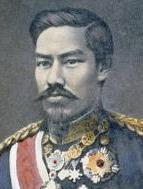 1894
- Dual Entente of Russia and France - Russia,
concerned about relations with Austria over the Balkans,
turned to France in a formal alliance against attack by
Germany, Austria's partner in the Triple Alliance.
1894
- Dual Entente of Russia and France - Russia,
concerned about relations with Austria over the Balkans,
turned to France in a formal alliance against attack by
Germany, Austria's partner in the Triple Alliance.
1894
-
Rise of Japan - With the Meiji emperor (left)
assuming direct control of the country in 1868, Japan
started rapid modernisation along western lines. In
1894-95, war with China led to the acquisition of Formosa.
Korea was annexed in 1910.
 1896
-
The Kruger Telegram. The Boer Republic of the
Transvaal in South Africa was internally self-governing
under President Kruger (left). To bring it fully
under British control, a raid was made into Transvaal led
by Jameson, head of Cecil Rhodes (of Rhodesia) private
army. The raid failed and the Kaiser sent a congratulatory
telegram to Kruger. It's offensive tone helped start
Anglo-German relations on the road towards war.
1896
-
The Kruger Telegram. The Boer Republic of the
Transvaal in South Africa was internally self-governing
under President Kruger (left). To bring it fully
under British control, a raid was made into Transvaal led
by Jameson, head of Cecil Rhodes (of Rhodesia) private
army. The raid failed and the Kaiser sent a congratulatory
telegram to Kruger. It's offensive tone helped start
Anglo-German relations on the road towards war.
1897
-
European Powers in China. A German naval force
seized Tsingtao and the Shantung Peninsula. Britain
already controlled Hong Kong and much of the commerce of
south and central China, Portugal occupied nearby Macao,
and France had taken over Indo-China.
1898
- British Isolation. Russian threats to British
influence in China led to Britain reconsidering its policy
of isolation and entering into a peacetime military
alliance. British overtures to Germany were rejected.
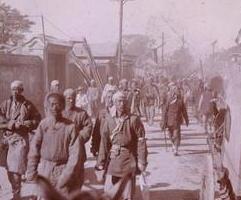
1898 -
Foreign Takeover of China - As the Great Powers
scrambled for concessions in China came to an end, Russia
took over Port Arthur on the Yellow Sea. (right - a
company of Boxers in Tien Tsin, two years later in the
revolt against foreign domination)
1898
-
The Anglo-French Fashoda Incident. Thirteen years
after the death of General Gordon at Khartoum, Gen
Kitchener reoccupied the Sudanese capital following the
Battle of Omdurman. Only two months previously, a small
French force had reached Fashoda, south of Khartoum, and
claimed the Upper Nile for France. Gen Kitchener sailed to
take Fashoda (a Lt David Beatty commanded one of the
gunboats). After a lengthy confrontation between the two
countries and threat of war, agreement was reached in
early 1899 on Anglo-French spheres of influence in Africa.
1898
-
Rise of the United States - The sinking of the USS
'Maine' in Cuba's Havana harbour (right) led to
the Spanish-American War. As part of the USA's continued
rise to world power, the Philippine Islands and Guam in
the Pacific were taken over from Spain.
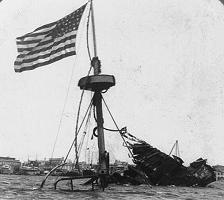
1899
-
Samoa. Disputes between Germany and Britain
(although not the United States) over the future of Samoa
were resolved. Germany and the U.S. took control of the
island group and Britain withdrew completely in exchange
for Tonga and the German Solomon Islands (including an
island known as Guadalcanal!).
1899
-
Start of the Boer War - Transvaal and the Orange
Free State entered into an alliance, rejected continued
British control, and in October, the Boers attacked
British Bechuanaland, Cape Colony and Natal. Mafeking,
Kimberley and Ladysmith were besieged. Europe supported
the Boers against Britain in a war that lasted until 1903.
1900
-
Boer War. By June, the Transvaal cities of
Johannesburg and Pretoria had fallen to British forces and
the Republic annexed by Britain.
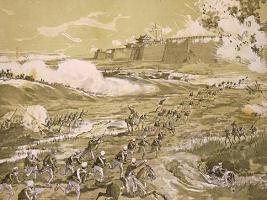 1900
-
Chinese Boxer Rebellion. After 60 years of
dismemberment by foreign powers, the Chinese at last
reacted. A Chinese secret society nicknamed the 'Boxers',
secretly supported by the Chinese empress, developed to
rid China of foreign domination. A series of massacres led
to the siege of the international Legation Quarter in
Peking, finally lifted after two months by the troops of
eight nations - European, Russian, American and Japanese.
(right - the "11th Regiment" attacking Tientsin,
believed to be a Japanese unit)
1900
-
Chinese Boxer Rebellion. After 60 years of
dismemberment by foreign powers, the Chinese at last
reacted. A Chinese secret society nicknamed the 'Boxers',
secretly supported by the Chinese empress, developed to
rid China of foreign domination. A series of massacres led
to the siege of the international Legation Quarter in
Peking, finally lifted after two months by the troops of
eight nations - European, Russian, American and Japanese.
(right - the "11th Regiment" attacking Tientsin,
believed to be a Japanese unit)
1901
- Anglo-German Relationships. The two countries
continued alliance negotiations, which could led to
Britain becoming a member of the Triple Alliance of
Germany, Austria-Hungary and Italy. Germany continued to
prolong discussions, even at the risk of driving Britain
into the Dual Entente of France and Russia, but they
finally broke down over the Boer War.
1902
-
Anglo-Japanese Treaty of Alliance - Signed to
provide both powers with an ally and to counter Russian
expansionism.
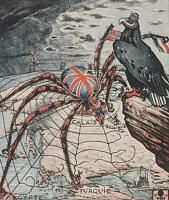 1904
- 'Entente Cordiale' of France and Britain - Out of
fear of Germany, Britain and France settled a number of
differences (including France exchanging her interests in
Egypt for a free hand in Morocco), and entered into an
informal alliance. Although not a military pact, the two
countries later consulted on both military and naval
matters right up to the outbreak of the Great War. (right
- a 1915 German view of the Entente Cordiale)
1904
- 'Entente Cordiale' of France and Britain - Out of
fear of Germany, Britain and France settled a number of
differences (including France exchanging her interests in
Egypt for a free hand in Morocco), and entered into an
informal alliance. Although not a military pact, the two
countries later consulted on both military and naval
matters right up to the outbreak of the Great War. (right
- a 1915 German view of the Entente Cordiale)
1904-05
-
Russo-Japanese War - Disputes over Manchuria and
Korea caused war. After destroying the Russian Baltic
Fleet at the 1905 Battle of Tsushima and defeating Russia,
Japan was recognised as a world power. (below right -
Russian armoured cruiser 'Pallada' hit by 500lb shell in
Port Arthur)
1905
- Russian Revolution - Partly because of Russia's
defeat by Japan, the 1905 Russian Revolution (which
included the mutiny on battleship 'Potemkin') brought
about political concessions by the Tsar.
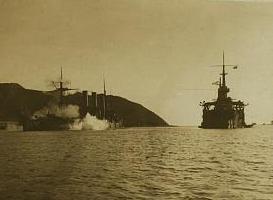
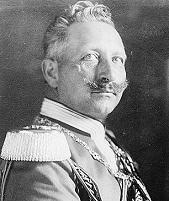 1905
-
First Moroccan Crisis - Fearing France would try to
annex Morocco, Kaiser Wilhelm II (left) visited
Tangier and announced his support for the Sultan.
1905
-
First Moroccan Crisis - Fearing France would try to
annex Morocco, Kaiser Wilhelm II (left) visited
Tangier and announced his support for the Sultan.
1907
- Triple Entente of Russia, France and Britain -
Britain and Russia settled a number of differences in
Asia. Then with both countries concerned about Germany,
but friendly with France, the 1894 Dual Entente and the
1904 'Entente Cordiale' became the Triple Entente of
Russia, France and Britain.
1908
- Bosnia Crisis - An enlarged Bulgaria declared full
independence from Turkey. Almost immediately Austria
annexed the semi-independent Slav/Serb province of
Bosnia-Herzegovina arousing the hostility of Serbia and
Russia.
1911
-
Second Moroccan (Agadir) Crisis - With French
troops in Morocco, and fearing France would proclaim a
protectorate, Germany sent the gunboat 'Panther' to
Agadir. Germany backed down after a speech by David Lloyd
George. Morocco came under French control in 1912.
1911-12
-
Italian-Turkish War - Italy defeated Turkey and
took the Dodecanese Islands in the Aegean and
Tripoli/Libya in North Africa. All of North Africa was now
in European hands, and the European powers had completed
the partition of Africa. Only Ethiopia and Liberia
remained independent.
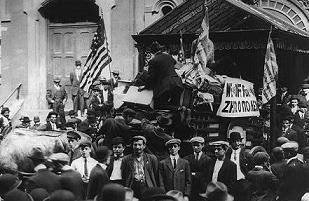 1912-13
-
Balkan Wars - Turkey had by now been expelled
almost completely from Europe and the Balkans. In the
First War of 1912/13, Greece, Serbia, Montenegro and
Bulgaria defeated Turkey, divided Macedonia between
themselves, and created the new country of Albania.
Bulgarian dissatisfaction with her gains led to the Second
Balkan War (1913) against her previous allies, and to
defeat. Serbia (Austria's enemy) emerged as the leading
Balkans power. (right
- New York Greeks leaving for the Balkans Wars)
1912-13
-
Balkan Wars - Turkey had by now been expelled
almost completely from Europe and the Balkans. In the
First War of 1912/13, Greece, Serbia, Montenegro and
Bulgaria defeated Turkey, divided Macedonia between
themselves, and created the new country of Albania.
Bulgarian dissatisfaction with her gains led to the Second
Balkan War (1913) against her previous allies, and to
defeat. Serbia (Austria's enemy) emerged as the leading
Balkans power. (right
- New York Greeks leaving for the Balkans Wars)
1914
- By now the international tensions were many and
complex. On what became the Allied side, these
include:
British
fear of German naval power and colonial ambitions;
France
never relinquishing her claim to Alsace and Lorraine;
Russia
championing the Balkan Slavs against the
Austrians with Serbia seeking to be leader of those
Slavs; and
Italy
wanting Austrian territory.
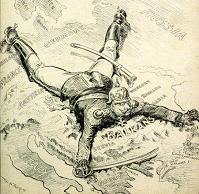 On
the part of the Central Powers (right - one
allied view of German aims):
On
the part of the Central Powers (right - one
allied view of German aims):
Germany
continued to envy British colonial and naval
power;
Austria
was under growing pressure to grant more independence
to her many minority populations including Serbs; and
Turkey
came under growing German military influence.
FINAL
STEPS, Summer 1914
Following
the assassination of Austrian Archduke Ferdinand in June
1914, seven European nations went to war between late July
and early August 1914:
The
Central Powers of Austria-Hungary and Germany (the
Triple Alliance less Italy and Rumania); and
The
Allies of the Triple Entente (Russia, France and
Britain and their Empires) in defence of Serbia and
Belgium:
June
1914
28th
- Archduke Franz Ferdinand, nephew of Emperor Franz
Josef of Austria-Hungary and heir to the throne, and his
wife, were visiting Sarajevo, capital of annexed
Bosnia-Herzogovina. Both were shot and killed by student
Gavrilo Princip, member of a Serbian secret society.
July
1914
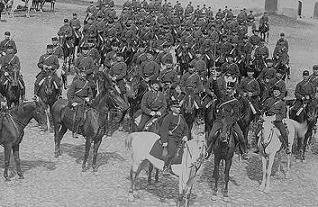 23rd
- Austria, threatened by Russian support for Serbia, but
now assured of German backing, sent an ultimatum demanding
that Serbia suppress all anti-Austrian activities.
(right - Austrian cavalry, year not known)
23rd
- Austria, threatened by Russian support for Serbia, but
now assured of German backing, sent an ultimatum demanding
that Serbia suppress all anti-Austrian activities.
(right - Austrian cavalry, year not known)
25th
- Serbia ordered mobilisation, but also agreed to meet
most of Austria's demands.
28th
- Austria declared war on Serbia, and next day bombarded
Belgrade the Serbian capital. Austrian forces were not yet
ready to invade.
30th
- Russia, committed to the defence of Serbia, finally
decided on general mobilisation.
31st
- Austria announced general mobilisation. Germany insisted
Russia halt mobilisation and demanded to know if France
would remain neutral if Germany went to war with Russia.
August
1914
1st
- France mobilised. Germany also ordered
mobilisation and declared war on Russia (the German
Schlieffen Plan required France to be defeated in battle
before Russia could be attacked, thus making war with
France inevitable). Italy announced neutrality.
2nd
- Germany invaded Luxembourg early on the 2nd and
sent a note to Belgium demanding free passage of troops
through Belgium territory for the attack on France.
Britain assured France that the British Fleet would
protect the French coast and shipping from German attack.
 3rd
- Belgium refused German demands, and the King of the
Belgians appealed for the preservation of Belgian
neutrality (right - the 'scrap of paper'). Germany
declared war on France.
3rd
- Belgium refused German demands, and the King of the
Belgians appealed for the preservation of Belgian
neutrality (right - the 'scrap of paper'). Germany
declared war on France.
4th
- Britain protested against German violation of Belgian
territory. Invading Belgium early on the 4th, Germany
declared war on Belgium. British mobilisation was ordered;
Britain went to war with Germany from midnight on the 4th.
6th
- Austria finally declared war on Russia.
10th
and 12th - France and Britain declared war on
Austria-Hungary.
23rd
- Outside Europe, Japan declared war on Germany.
NATIONS
OF THE WORLD AT WAR, 1914-18
Most
of the world eventually joined the seven European nations
at war:
EUROPE
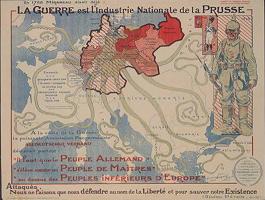 Allies:
Western - Great Britain and Ireland, France, Belgium,
Luxembourg. joined by Italy in May 1915, Portugal in March
1916 and Greece in June 1917; Eastern - Russia and Serbia.
Joined by Montenegro and Albania in January 1916, and
Rumania in August 1916. (right
- A French view of Germany's "main industry")
Allies:
Western - Great Britain and Ireland, France, Belgium,
Luxembourg. joined by Italy in May 1915, Portugal in March
1916 and Greece in June 1917; Eastern - Russia and Serbia.
Joined by Montenegro and Albania in January 1916, and
Rumania in August 1916. (right
- A French view of Germany's "main industry")
Central
Powers - Germany and Austro-Hungary. Joined by
Turkey in November 1914, and Bulgaria in October 1915.
Remaining
Neutral - Norway, Sweden, Denmark, Holland,
Switzerland, and Spain.
NORTH and SOUTH AMERICA
British
Empire - Canada, Newfoundland, Bermuda, West Indies,
British Guiana, and Falkland Islands; French Empire
- West Indies and French Guiana.
Countries
joining Allies - United States in April 1917,
followed by Cuba, Haiti, Guatemala, Honduras, Nicaragua,
Costa Rica, Panama and Brazil. In addition Ecuador, Peru,
Bolivia and Uruguay broke off relations with Germany and
became associated powers.
The
other countries of South America remain neutral -
Colombia, Venezuela, Paraguay, Chile, and Argentina.
AFRICA
Largely
British
or French Empire plus Italian - Libya,
Eritrea, Italian Somliland; Belgium - Belgian
Congo; Portuguese - Angola, Mozambique.
German
- German West Africa (Togo, Kamerun), German South West
Africa, German East Africa (postwar Tanganyika).
Independent
countries - Liberia joined Allies in August 1917,
Ethiopia.
ASIA
British
Empire
or dominated - Aden, Oman, Trucial Coast of Arabia,
Kuwait, India, Burma, Malaya, northern Borneo, Hong Kong,
Wei-hai-wei in northern China; French -
Indo-china; United States - Philippine Islands.
Countries
joining
Allies - Japan in August 1914, Siam in July 1917,
China in August 1917.
German
- Kiachow Bay in northern China; Turkish or Ottoman
Empire - Turkey in Europe and Asia Minor, the Levant
States of Syria and Lebanon, Palestine, most of present
day Jordan and Iraq, the Red Sea coast of Arabia including
the Hejaz and Yemen.
Remaining
Neutral - Persia, Afghanistan, Dutch East Indies.
PACIFIC
British
Empire
- Australia, New Zealand, Papua, many island groups
in the South Pacific; French - Island groups in
South Pacific; United States - Hawaiian Islands,
Guam in the Marianas group, Samoa.
German
- Mariana, Caroline and Marshall Island groups in the
Central Pacific, German New Guinea, Bismarck Archipelago,
Western Samoa.
